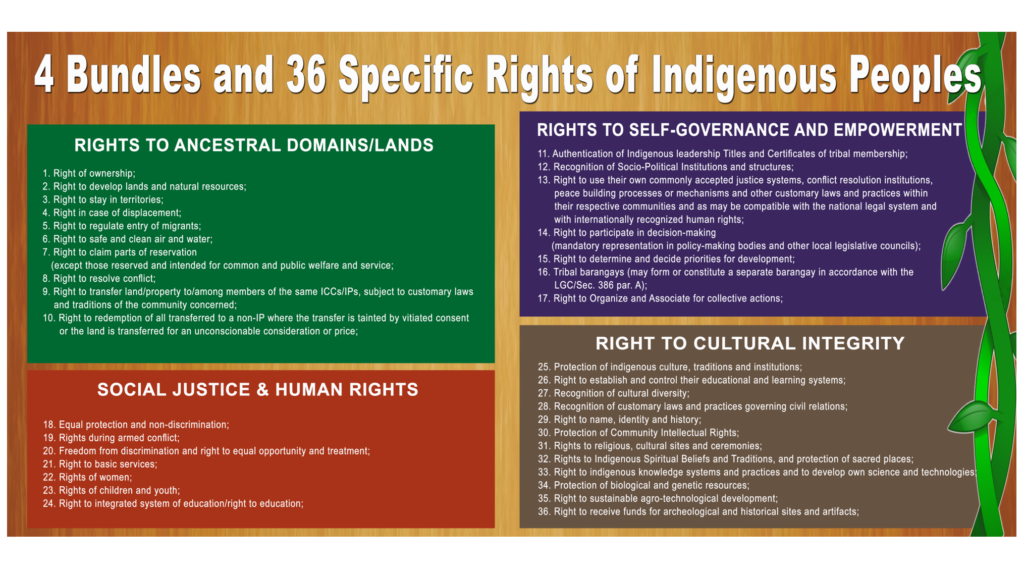
RIGHTS TO ANCESTRAL DOMAINS/LANDS
1. Right of ownership;
2. Right to develop lands and natural resources;
3. Right to stay in territories;
4. Right in case of displacement;
5. Right to regulate entry of migrants;
6. Right to safe and clean air and water;
7. Right to claim parts of reservation (except those reserved and intended for common and public welfare and service; 8. Right to resolve conflict;
9. Right to transfer land/property to/among members of the same ICCs/IPs, subject to customary laws and traditions of the community concerned;
10. Right to redemption of all transferred to a non-IP where the transfer is tainted by vitiated consent or the land is transferred for an unconscionable consideration or price;
.
RIGHTS TO SELF-GOVERNANCE AND EMPOWERMENT
11. Authentication of Indigenous leadership Titles and Certificates of tribal membership;
12. Recognition of Socio-Political Institutions and structures;
13. Right to use their own commonly accepted justice systems, conflict resolution institutions, peace building processes or mechanisms and other customary laws and practices within their respective communities and as may be compatible with the national legal system and with internationally recognized human rights;
14. Right to participate in decision-making (mandatory representation in policy-making bodies and other local legislative councils);
15. Right to determine and decide priorities for development;
16. Tribal barangays (may form or constitute a separate barangay in accordance with the LGC/Sec. 386 par. A);
17. Right to Organize and Associate for collective actions;
.
SOCIAL JUSTICE & HUMAN RIGHTS
18. Equal protection and non-discrimination;
19. Rights during armed conflict;
20. Freedom from discrimination and right to equal opportunity and treatment;
21. Right to basic services;
22. Rights of women;
23. Rights of children and youth;
24. Right to integrated system of education/right to education;
.
RIGHTS TO CULTURAL INTEGRITY
25. Protection of indigenous culture, traditions and institutions;
26. Right to establish and control their educational and learning systems;
27. Recognition of cultural diversity;
28. Recognition of customary laws and practices governing civil relations;
29. Right to name, identity and history;
30. Protection of Community Intellectual Rights;
31. Rights to religious, cultural sites and ceremonies;
32. Rights to Indigenous Spiritual Beliefs and Traditions, and protection of sacred places;
33. Right to indigenous knowledge systems and practices and to develop own science and technologies; 34. Protection of biological and genetic resources;
35. Right to sustainable agro-technological development;
36. Right to receive funds for archeological and historical sites and artifacts;
.
Updated by: Alvin Sison – March 29, 2023
